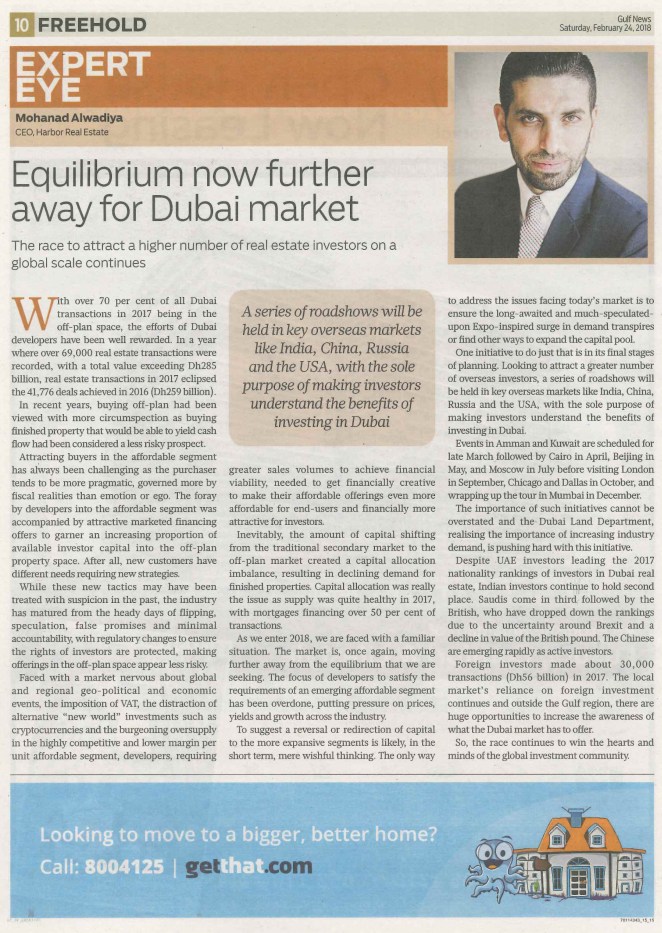While great strides have been made in the development and implementation of a legal and regulatory frame in Dubai’s Real Estate industry, there remains one area where the industry seems to be lagging the rest of the world. That area is Data Availability and Transparency.
There are several reasons why Data Availability and Transparency are important to the efficient and effective operation of any industry and why, logically, they can foster development and growth.
1. Build Trust within the Industry – Making more information publicly available will empower all the different stakeholders and participants in the industry to the extent where a bedrock of trust is developed simply because the data underlying assumptions, assertions, opinions and points of view is available, accessible, analysable and can be utilised to build trust between parties.
2. Generate Ideas – The availability and subsequent analysis and modelling of data underpins the generation of new ideas. Create an online forum for your local government where residents are encouraged to participate by providing alternative ideas. Brush up on new ways in which communities interact with their governments online.
3. Risk Assessment – We operate within an industry whereby decisions can involve huge capital outlays and where there may be multi-year lags in returns on billions of dirhams of capital employed. In addition, every day, there are hundreds of decisions made, which are not of the same value. Average people, making life changing decisions on whether to buy, invest in or rent properties, are typically making the biggest decision of their life and, without data from reliable third party sources, the perceived risk and resulting nervousness around a transaction can be debilitating.
4. Increase Community Engagement – Once data is available and properly communicated, the number of people becoming engaged or interested in the industry will multiply significantly. News, data and analyses will drive dialogue among a broader spectrum of the community so that the discussions are not only limited to those who are operating within the industry, but with the broader community as well
5. Develop a Better Understanding of Industry Participants Needs – Effective gathering, organising, analysing and dissemination of data will enable the development of a far greater and deeper understanding of what the various participants and stakeholder’s needs are. Once these needs are identified, ideas and initiatives can be generated to ensure that the industry is providing its constituents the benefits that they desire, on an equitable basis. Empower Citizens When local governments are transparent, levels of trust increase. When the trust level is high, citizens begin to feel empowered to take responsibility. Read here about the open city concept.
6. Measure Performance – There is no doubt that proper performance measurement is dependent upon the availability of good data. The market today is far too cluttered with articles, opinions and predictions that are not based on a sound bedrock of relevant, up to date and analysable data. To be able to accurately measure industry performance and to be able to drill down to a granular level of detail to analyse why the industry is performing as it is, what the industry is being affected by, where the industry is strongest or weakest and who is most positively or negatively affected is critical is assessing the industry overall health.
7. Attract People to the Industry – there is no doubt that, as data availability improves, more people will be attracted to the industry as the need for better and more frequent analysis is required. As this intellectual base develops, the industry will build a repository of knowledge that will only serve to enable the industry to operate more effectively and efficiently over time.
8. Boost the Overall Economy – There is no doubt that a robust, efficient and developing Real Estate and Construction Industry is a boon to any economy. Better data facilitates better planning for government expenditures in infrastructure and technology, better resource management, more effective innovation and, ultimately. Greater contribution of the industry to overall economic development and growth.
9. Foster greater cooperation between Public and Private Sectors – The more effective the communication, cooperation, priority setting and shared planning between the Public and Private Sectors, the better the solutions for the community and economy overall. Excellence can be attained through synchronisation of objectives and objectives can only be formulated after proper data analysis and goal setting. The key to success is a shared understanding of the vision and the role each industry participant has in ensuring its achievement.
10. Educate the World – We all preach about global best practice but how can it be properly applied without the understanding that blooms from proper data analysis. And why not have the vision where similar industries in other countries around the world are looking towards Dubai as the centre of the world’s best practice? It’s possible … but it all starts with having up to date, relevant, accessible and analysable data. It’s difficult to excel without it.










